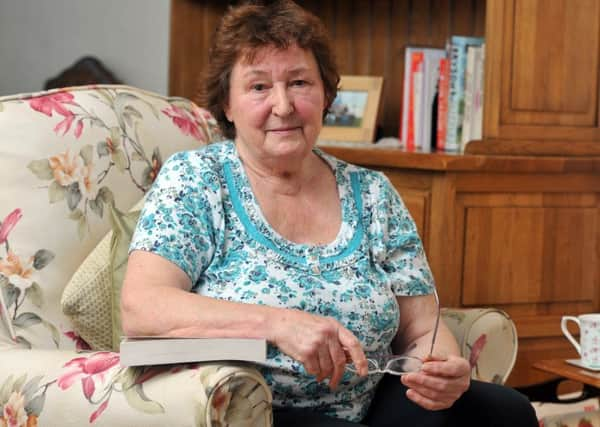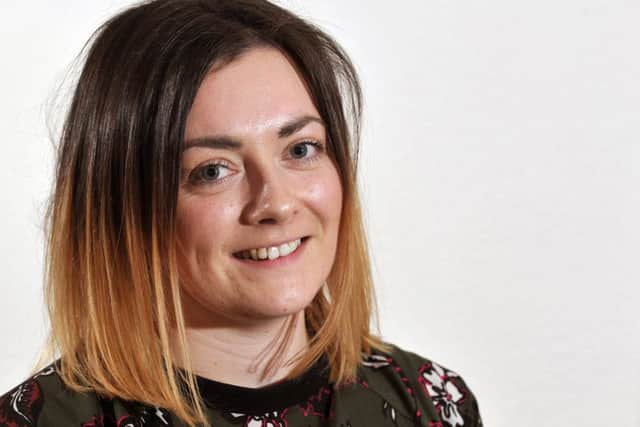Facing up to the realities of living with dementia


Elaine Kershaw is 78 but could easily pass as someone 10 years younger.
She’s articulate and quick witted and has a family and an active social life. But Elaine also has dementia.
Advertisement
Hide AdAdvertisement
Hide AdThe retired school teacher, who lives near Bradford, was diagnosed with vascular dementia last summer. It was a devastating blow to the mother-of- four who has always prided herself on being self-reliant.


Elaine admits that she has struggled to remember names throughout her life. “I used to be a teacher and every year you had new names to remember. I’d ask the pupils to write their name on a bit of paper and put it on their desk and after a few weeks I’d be fine. I just needed to see it written down,” she says.
“At school it was a bit of a nuisance but some of the other teachers had the same thing, because there were a lot of names to remember. You might have 60 different pupils in a year. But it didn’t worry me because once I’d seen the name a few times and I could put a face to the name I was OK.”
Elaine worked at what was Brontë Middle School, in Oakworth, but after she retired she began to worry that aspects of her memory were starting to slip. “As the years have gone on I’ve forgotten people’s names and that did worry me a bit,” she adds.
Advertisement
Hide AdAdvertisement
Hide AdIt was one of her sisters who first became concerned that she was forgetting things which prompted her to get tested. “We’d be on the phone and she’d say: ‘I told you that the other day’ and that made me think,” says Elaine.


“I do sometimes get confused, I have to be honest, and sometimes I struggle to get organised, whereas at one time I’d be like this,” she adds, snapping her fingers quickly.
She first went to see her doctor a couple of years ago. “I said that I seemed to get mixed up and forget things and it was the GP who told me about the memory clinic.”
Elaine went to the clinic which carried out various tests on her memory and while she was able to answer general knowledge questions she struggled to remember names. She was initially diagnosed with mild cognitive impairment but then 12 months later after going for an MRI scan she was diagnosed with vascular dementia.
Advertisement
Hide AdAdvertisement
Hide AdWhen Elaine was told she had dementia it came as a shock. “I was very frightened to tell you the truth and of course the first thing you do is go on the internet.
“I’ve always been somebody who needs to know if something’s wrong. I remember my dad said to me when I was about six or seven: ‘You’re far too independent’. But I didn’t know what that meant so I had to go and look it up, and it was the same when I was told about the dementia.”
Vascular dementia is the second most common type of dementia (after Alzheimer’s disease) and affects around 150,000 people in the UK. The word “dementia” is an umbrella term for a set of symptoms that can include memory loss and difficulties with thinking, problem-solving or language.
In the case of vascular dementia, these symptoms occur when the brain is damaged because of problems with the supply of blood.
Advertisement
Hide AdAdvertisement
Hide Ad“Sometimes when I think about it, it does frighten me to death but I still need to know. I’ve read all the books which can be helpful. They say to write things down which I do try and do but I do get confused and I know that indecision can be part of dementia,” says Elaine.
“But I don’t think I found out anything more about dementia because the literature the Alzheimer’s Society gives you is extremely good.”
Elaine, who married twice, worked as a nurse for several years before later becoming a teacher. She lived in Spain for 17 years but has spent most of her life in West Yorkshire. It’s because she’s always been an independent person that she finds the prospect of one day losing that frustrating and daunting.
“I am having problems making decisions and it’s little things really. I look at the calendar and think I should be going to the memory clinic but then I think I have to go and see one of my sons and I get into a dither.
Advertisement
Hide AdAdvertisement
Hide Ad“And it’s silly because I’ve juggled having a job, raising four boys, paying a mortgage and doing everything and I’m there thinking what should I do. And I end up sitting down and I don’t know what I’m doing – that is something I’ve noticed more recently.
“Whether I’ll go downhill rapidly I don’t know. I just don’t want to be a burden to anyone – that’s one of my main worries.”
Despite such understandable concerns Elaine is determined to face up to her condition and has joined several groups run by the Alzheimer’s Society. She goes to the FIT group, for people with dementia, and took part in a seven-week pilot programme based around self-care and peer support.
Dementia support manager Carly Driscoll, who is based at the Alzheimer’s Society office in Shipley, says these groups make life easier for people living with the condition.
Advertisement
Hide AdAdvertisement
Hide Ad“It’s about raising awareness of dementia around the community and also helping them try out different services to see how dementia-friendly they are.”
Recently Elaine was also part of a recruitment panel interviewing for a new member of staff at the Shipley branch, something she found hugely rewarding. “I really enjoyed that day,” she says. “It felt like being back in the staffroom at school and at the end there was a lovely camaraderie. We talked about who we’d interviewed and what we thought of them and I came home and I felt like I’d done something good.”
The Alzheimer’s Society benefits, too. “It’s really valuable for us because it means the people who the service is for have a say in the people who work for them,” says Carly. “We know that dementia brings challenges and we work with people to deal with these. But even with the challenges that it brings it is possible to live well. There’s always something people are able to do, it’s just about making sure the right support is in place.”
There are now more than 850,000 people in the UK and in November dementia overtook heart disease as the leading cause of death in England and Wales.
Advertisement
Hide AdAdvertisement
Hide AdIt has become one of the biggest health challenges of the modern age and getting an early diagnosis is important because it means people can start receiving treatment and support more quickly. This enables them to have a better quality of life and can also delay the time before they need to go into a care home which, in turn, reduces the stress for both them and their family.
For Elaine, the future remains uncertain and while each person’s experience of dementia is different she hopes that by talking about her situation it may encourage other people to get tested.
“I think it’s better to know what’s happening. Knowledge empowers people and also it means you can start to come terms with the situation and I think that’s a big step.”
Million sufferers within a decade
Alzheimer’s Society chief executive Jeremy Hughes told The Yorkshire Post: “Alzheimer’s Society research shows that 850,000 people in the UK have a form of dementia. More than 67,000 of those people live in Yorkshire and the Humber. In less than ten years over a million people will be living with dementia nationally. This will soar to two million people by 2051.
Advertisement
Hide AdAdvertisement
Hide Ad“Raising awareness is vital to create communities of support around the growing numbers of people diagnosed with the condition. It is possible to live well with dementia with the right help and support which Alzheimer’s Society can provide.”
For more information go to www.alzheimers.org or call the national helpline on 0300 222 11 22.